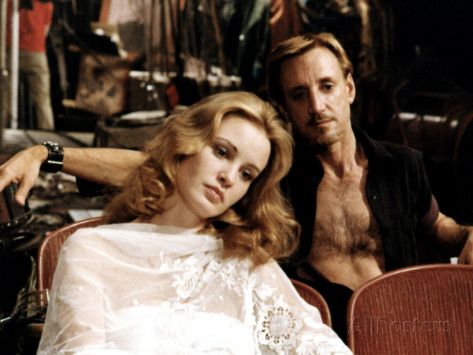“So be it,” journalist Helen Grant dramatically announces as she lifts up her camera and starts snapping pictures of a body in a casket, “I’m …. a ….. WHORE!”
That is just one of the many wonderfully, over-the-top moments that can be found in the 1985 film, Scandal Sheet. Directed by David Lowell Rich, Scandal Sheet stars Burt Lancaster as Harold Fallen. If this movie were being made today, Fallen would be in charge of a TMZ-style website. Since this movie was made in the 80s, Fallen is the publisher and editor of a sleazy tabloid magazine. He specializes in stories about aliens and ghosts. When someone brings him in a story about the ghost of Grace Kelly haunting the beaches of Malibu, he announces, “Front page!” When someone else tells him about a woman who wants to marry a man from outer space but who can’t find anyone to perform the ceremony, Fallen arranges to get the woman a lawyer.
When Fallen isn’t tracking down ghosts and arranging for interplanetary marriages, he’s trying to destroy celebrities. When the film begins, he’s obsessed with taking down Ben Rowan (Robert Urich). We’re told that Ben Rowan is one of the world’s top movie star. (It’s important that we’re told this because there’s nothing about Urich’s bland performance that would lead us to suspect that to be the case.) Ben’s career is in trouble because he’s got a drinking problem. He just got out of rehab but no insurance company is willing to insure him. His wife, Meg North (Lauren Hutton), is demanding that Ben be cast in her latest movie. Everyone in Hollywood is like, “No way.”
It has the potential to be a big story and Fallen wants to be the first to break it. But to do so, he’s going to need an inside source. That’s where Helen Grant (Pamela Reed) comes in. Helen was Meg’s college roommate and she’s still friends with both her and Ben. Fallen decides to hire Helen to work for his magazine. The only problem is that Helen is a serious journalist. She writes stories about homeless children. She has no desire to work for a tabloid.
“I’ll pay you more than you’re making right now,” Fallen tells her.
Helen’s not interested.
“I’ll pay you $80,000 a year.”
Helen’s interested.
Against her better judgment, Helen accepts Fallen’s offer. At first, things seem okay. She’s a bit annoyed with having to work with a sleazy photographer named Simon (Peter Jurasik, giving a wonderfully reptilian performance) but she’s got a nice house and her son is going to a good school and she gets to use the company credit card and she even gets a housekeeper out of the deal!
Then Fallen tells her that her next assignment is to write about Meg and Ben. Helen refuses but she soon discovers that Howard Fallen is not an easy person to refuse. Not when he’s got people watching your every move, along with paying your housekeeper to spy on you. When her former boss (Max Wright) angrily tells her that no reputable magazine will ever work with her again, Helen is left with only two options: Become a whore or starve.
Scandal Sheet is a lot of fun. Just the fact that the main bad guy is named Howard Fallen should tell you almost everything you need to know about this movie. He’s Fallen — as in a fallen angel. At the end of the movie, he even wears all black with a white tie, which we all know is the typical modern-day costume of demons pretending to be human. (At one point, Fallen even says that he’s going to make someone an offer that they can’t refuse, giving us all a chance to see what The Godfather would have been like if Burt Lancaster had played Don Vito.) Lancaster gives a charismatic performance and he’s so effortlessly manipulative that it’s hard not to enjoy watching him, even if he is destroying innocent people. The rest of the cast is okay. As I said earlier, Robert Urich was a bit too bland to be a convincing film star but Pamela Reed does a good job of capturing Helen’s struggle to decide whether to side with good or evil and Lauren Hutton tears into the scenery with just the type of ferocity that a film like this requires. Late in the film, when she spits in Helen’s face, it’s the most dramatic spitting that you’ll probably ever see.
Scandal Sheet is an enjoyably over-the-top, anti-press melodrama. Watch it with someone who you would be willing to sell out for $80,000 a year.
Other Entries In The 18 Days Of Paranoia:






